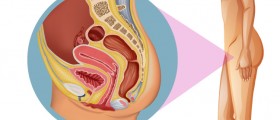
In every woman’s life there comes the time when her menstrual period stops, and this is known as menopause. This can happen naturally, caused by aging but there are also women who have experienced certain surgical procedures or radiation which has caused cessation of their periods. Menopause is not a brief period of time, and it could last for several years, even 8 years, sometimes, of course, including some time before actual stop of menstrual bleeding. As the postmenopausal period, many doctors consider women who stopped having menstruation over a year ago.
Changes in Menopause
As the woman grows older, her body changes. Approaching menopause, her periods start to be irregular and lengthier than ever before, and this transitional time is called perimenopause. In menopause there are several hormone changes every woman faces and experiences in a different way. There is a significant decrease of female sexual hormones, such as estrogen and progesterone, and there is also a decrease in male sexual hormones present in a woman’s body (testosterone and dehydroepiandrosterone or DHEA). Other hormone changes include: increase in luteinizing hormone (LH) and also rise of follicle stimulating hormone (FSH).
Symptoms of menopause vary for every woman, but they are usually some of the following: night sweating and hot flushes, vaginal dryness, swelling and tenderness of the breasts, bloating, itchiness, thinning of the skin and the hair, weight gain, heart palpitations and headaches and migraines. Women may also suffer from different mood changes and mood swings, including: agitation, anxiety, depression or lethargy. Low libido, memory and sleeping problems are also frequently present in menopausal patients.
Treatment of Menopausal Symptoms
Treatment options until recently were replacement hormones, so the treatment is known as the hormone replacement therapy or HRT. However, things have changed since the 2002, because studies published that there are probably more health risks than benefits of this kind of treatment for most of the patients. After that, the use of HRT has declined for over 50%, and many doctors refer their patients to alternative and herbal treatments.
National Institute of Health (NIH) in the United States even stated that alternative treatments for menopausal patients resolve problems for these women and that these therapies deserve further studies.
Herbal treatments for menopause have several goals, such as support of the adrenal glands, in order to produce estrogen, but also support of the nervous system, so that patients won’t have any more problems with insomnia, depression or anxiety. Also, these remedies are able to decrease episodes of hot flashes and night sweats and increase vitality, as well as positively affect the liver function.

















Your thoughts on this
Loading...